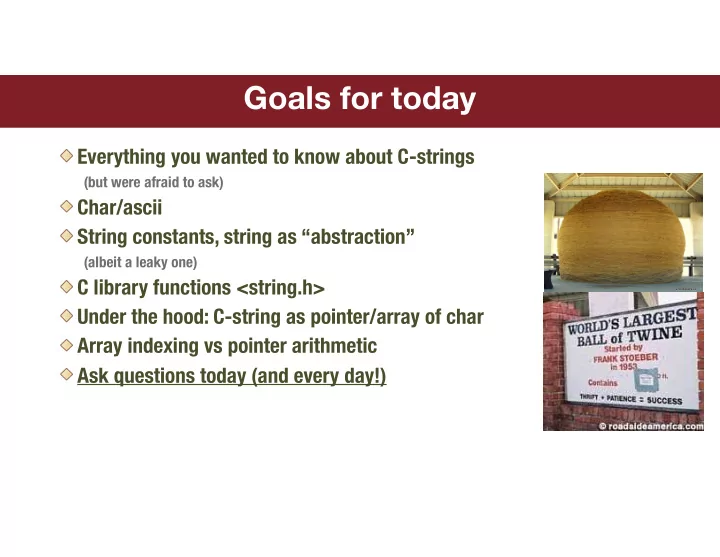

Goals for today Everything you wanted to know about C-strings (but were afraid to ask) Char/ascii String constants, string as “abstraction” (albeit a leaky one) C library functions <string.h> Under the hood: C-string as pointer/array of char Array indexing vs pointer arithmetic Ask questions today (and every day!)
Character data char is 1 byte 2 3 4 5 6 7 0: 0 @ P ` p (by definition in standard, never need to compute sizeof(char) 1: ! 1 A Q a q char may be signed or unsigned by default 2: " 2 B R b r Of consequence when promoting to larger type but not much else 3: # 3 C S c s 4: $ 4 D T d t Standard ASCII maps 0x00 - 0x7f to letters, digits, punct 5: % 5 E U e u man ascii to display table 6: & 6 F V f v 8th bit used as parity/error check in some situations 7: ' 7 G W g w 8: ( 8 H X h x No consensus for characters mapped to 0x80-0xff 9: ) 9 I Y i y Unicode A: * : J Z j z more robust/flexible but more complex, larger storage needs B: + ; K [ k { C: , < L \ l | char operations D: - = M ] m } single byte integer, man isdigit E: . > N ^ n ~ F: / ? O _ o
/afs/ir/class/cs107/samples/lect4 int my_isdigit(int ch) { return ch >= '0' && ch <= '9'; } int my_isxdigit(int ch) // from musl { return my_isdigit(ch) || ((unsigned)ch|32)-'a' < 6; }
Representing a sequence of chars How to represent sequence of chars? Stuff into a 4-byte or 8-byte word? Array/vector/list of char? C language features generally map straight to machine structures We saw this with behavior/operations of integers How does underlying system support sequence of anything? C-string is a simply a pointer! characters stored in sequential memory locations Null char used for termination b i n k y \0 str char *str = "binky"; What can you do with a C-string? read/write individual chars, e.g. str[index] man string for library functions
/afs/ir/class/cs107/samples/lect4 size_t my_strlen(const char *s) { size_t count = 0; while (s[count] != '\0') count++; return count; } char *my_strcpy(char *dst, const char *src) { char *result = dst; while ((*dst++ = *src++)) ; return result; } char *my_strncpy(char *dest, const char *src, size_t n) { // from man page size_t i; for (i = 0; i < n && src[i] != '\0'; i++) dest[i] = src[i]; for ( ; i < n; i++) dest[i] = '\0'; return dest; }
Let’s code! /afs/ir/class/cs107/samples/lect4/pig.c Pig latin: be => ebay trash => ashtray one => oneway Helpful string.h functions to consider: strcspn strcat, strncat
Recommend
More recommend